Environmental Stewardship

Use this Lenten season as a time to grow closer to God and simplify your life. Try a new suggestion from this list each day and experience the stronger relationships and calmer pace of an (almost) Amish lifestyle!
1. Start a giveaway box and add at least three items of clothes you have not worn in the last year.
2. Is there a form of technology that is ruling you like a master rather than serving you like a tool? Unplug for 24 hours and rediscover the peace that passes all understanding.
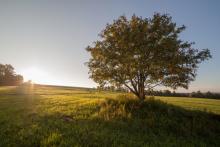
Lent is a time when we try to identify with our own weakness, so since we are about to start the Church’s penitent season, it was shocking to read Virgilio Elizondo’s account of how a people generally considered weak on the geopolitical stage – poor Mexicans and Chicanos – do not treat Ash Wednesday as a day of penitence at all.
“For the masses of the people, it has little to do with the beginning of Lent. Lent as a season of self-sacrifice is not really of special interest to the people: the entire year is a time of suffering and abnegation. On Ash Wednesday Mexican-Americans renew their cultic communion with mother earth. For them the earth has always been sacred and they retain a fundamental identity with it. The earth supports and regenerates life; itis life.”
What a beautiful and unexpected connection!
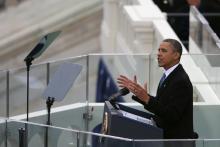
"Lincoln’s writings speak to me ... that though we may have our differences, we are one people, and we are one nation, united by a common creed. ... Lincoln saw beyond the bloodshed and division. He saw us not only as we were, but as we might be." - President Barack Obama
"We are confronted with the fierce urgency of now. …Over the bleached bones and jumbled residue of numerous civilizations are written the pathetic words: 'Too late.'" -Martin Luther King, Jr.
Dear President Obama,
Your words above aptly describe the greatness of Abraham Lincoln. Slavery was the moral crisis of his time, and because he fervently believed "we are one people," he took a stance which initially led to much adversity. But he rose to the challenge and the rest is history.
In a speech to Congress in 1862, Lincoln said: "The dogmas of the quiet past are inadequate to the stormy present. The occasion is piled high with difficulty and we must rise with the occasion. As our case is new, so we must think anew and act anew."
Circumstances have conspired to place you at the presidential helm during a moment of unprecedented global crisis. Last year, we saw one of the most prominent features of our planet — as seen from space — altered beyond recognition. A huge portion of the snow and ice white of the Arctic was simply, and stunningly, gone.
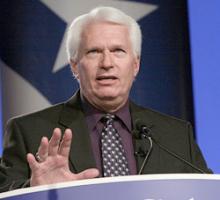
DIVINING GOD'S intent is incredibly easy—all you have to do is seek out his representatives here on earth, like Bryan Fischer, director of "issue analysis" for the American Family Association, "where he provides expertise on a range of public policy issues."
Indeed, Rev. Fischer speaks for the Lord on any number of topics (badness of gay people getting married, badness of Barack Obama who nurtures a "hatred of the white man," badness pretty much of anything that's changed since Fischer was born in 1951). But in the autumn, he offered the authoritative assurance that there was one thing God thought was really, really good: fossil fuel.
Fischer said that not using all the coal and gas and oil we could find was an affront to God—it would hurt God's feelings. In fact, he offered an analogy: Once "I opened up a birthday present that I didn't like, and I said it right out, 'Oh, I don't like those,'" he explained. "And the person that gave me the gift was there. And it just crushed that person. And you think, that's kind of how we're treating God when he's given us these gifts of abundant and inexpensive and effective fuel sources," Fischer added. "And we don't thank him for it and we don't use it. ... You know, God has buried those treasures there because he loves to see us find them."
That's really top-notch theology, as other similar top-notch theologians would attest. Dr. Calvin Beisner, for instance, is a founder of the Cornwall Alliance, the premier faith-based climate-change-denial operation on the planet. Sharing the microphone with Rev. Fischer, Rev. Beisner pointed out that not burning fossil fuel is really "an insult to God"—and that Jesus, too, wants us burning coal. If we didn't take advantage of all the flammable rocks on the planet, Beisner said, we would be like the "wicked and lazy steward" who was given talents by his master but simply buried them.
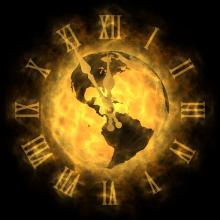
A RECENT RETREAT of evangelical environmentalists raised this theological question: Should we have expected most people in the developed world to hear the scientific evidence proving the great dangers of climate change and then decide to quickly change themselves—their view of the world, their lifestyles and politics—and to withdraw their support from the fossil fuel economy that is threatening the planet and its people?
Those of us gathered at the retreat didn't think so. We human beings just aren't that smart, wise, good, or unselfish. It's more human to deny the evidence, attack the messengers, delay the response, and just hope everything works out. That's what many have done. And since our political system is even more dysfunctional than most of the people it represents—and is bought and paid for by the gas and oil interests that control the economy—the chances are low for courageous and far-sighted leadership.
So what kind of wake-up call will it take to reduce the carbon emissions we humans create, which are warming the earth's temperature and endangering our future in increasingly dramatic ways? Perhaps it will take disruption and devastation—which is becoming the "new normal." So-called once-in-a-lifetime storms are now becoming frequent, with Superstorm Sandy only the most recent example.
Sandy seemed to get people's attention in a way we haven't seen since the 2010 BP oil spill in the Gulf. It came in a year when the lower 48 states suffered the warmest temperatures and most disruptive weather patterns since such records have been kept. We're already spending billions in emergency aid for the victims of hurricanes and weather disasters; those numbers will only increase. In addition to Sandy, we had 10 other billion-dollar weather disasters in 2012, including Hurricane Isaac and terrible tornadoes across the Midwest and Great Plains.
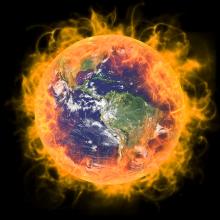
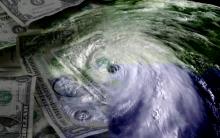
“We can’t wait any longer,” Sen. Chuck Schumer declared to his colleagues on Monday. “Ninety-one days ago, Sandy struck a body blow against New York. Today, finally, we can strike back and give our people the help they need to get back on their feet.”
Shortly following, the U.S. Senate passed a long-awaited $50.5-billion disaster aid package that was then sent to the White House for President Obama’s signature.
Superstorm Sandy was the largest Atlantic hurricane on record, though it was only ever a Category 2 storm at its strongest and had weakened to a Category 1 storm by landfall. Nevertheless, due to its immense size, incredible amount of moisture, and record-breaking storm surge, it is estimated to be the second costliest storm in the history of the United States after Hurricane Katrina in 2005.
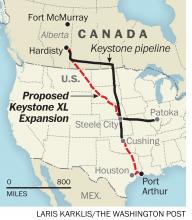
“If we fully develop the tar sands, we will certainly lose control of the climate. We will get to a point where we can not walk back from the cliff,” says climate scientist Dr. John Abraham. The Keystone XL pipeline is the lynchpin to developing the tar sands in Alberta.
I’ve been paying attention to the Keystone pipeline development since 2011 when it was under review by the State Department. I joined a group of religious leaders to deliver thousands of petitions to Dr. Kerri-Ann Jones, Assistant Secretary of State for Oceans and International Environmental and Scientific Affairs, asking her to to stop the pipeline. I said to her, “If this decision about the pipeline was made purely based on the climate science, we wouldn’t be here having this discussion.” She didn’t disagree. The exploitation of tar sands will significantly worsen the climate.
Now, new scientific data shows that developing the tar sands (and the pipeline to carry it) is worse than previously known. The video above shows climate scientists countering the notion that the climate impacts of the Keystone XL pipeline are small compared to total U.S. global greenhouse gas emissions. Nathan Lemphers, a Senior Policy Analyst with the Pembina Institute, details how the Keystone XL is a critical ingredient to significant expansion of tar sands. He dispels the myth being promoted by the tar sands oil industry that tar sands development is inevitable with our without Keystone XL. That’s not true. All other routes are similarly being blocked.

President Barack Obama’s Inauguration Address this week included a bold statement about his vision for addressing climate change. In fact, he redefined the issue of environmental protection as not only morally important but a command from God. After the vacuum of discussion of climate change during the presidential campaign, this proclamation came as a welcome surprise.
Most analyses of Obama’s speech point to the fact that the reason he was able to say what he did is that American public opinion has solidified behind these ideas. Plenty of polls will tell you that the number of Americans who accept the reality of climate change has soared in recent years, perhaps partly due to the natural disasters the president mentioned.

This winter, fiction revealed truth about climate change.
As a teacher, I relish the escape provided by pleasure reading before I return to the classroom for the next semester at Warren Wilson College, where I teach environmental education.
In December, without reading reviews or making a list, I visited my independent bookstore, Malaprop’s and purchased two books: Barbara Kingsolver’s Flight Behavior (2012) and Lauren Groff’s Arcadia (2012). I’m a long-time Kingsolver fan and bought her book as a gift, with the goal of reading it before wrapping it. And the cover of Arcadia, with its teal VW bus and field of sunflowers, drew me into purchasing what I thought was my second random choice for recreational reading.
Both books, it turns out, integrated climate change into the plotline, weaving scientific truths about global warming into the lives of fictional characters. And just as compelling, both works of fiction featured spiritual community at the center of critical decisions about the future of the land and its inhabitants.
Of note, critics have bemoaned the lack of fiction centered on climate change, a paucity that seemed to mirror our public denial of this scientific reality. In a 2010 blog on openDemocracy, professor and author Andrew Dobson even outlined the components of a “climate-change novel” that include a grim future, characters who explore ethical choices around global warming, and (no surprise here) extreme weather events. He ended his piece with this challenge: “So there’s the recipe. Who’s going to write the book?”
One day after making climate change a key issue in his inaurugal address President Obama has decided to put off a decision on the Keystone XL Pipeline until April. The issue was thrust to the front of the agenda today when the governor of Nebraska approved the pipeline. The ultimate fate of the project is in Obama's hands. The Guardian reports:
Republicans immediately pushed Obama to approve the pipeline. "There is no bureaucratic excuse, hurdle or catch President Obama can use to delay this project any further," John Boehner, the Republican speaker of the House of Representatives, said in a statement. "He and he alone stands in the way of tens of thousands of new jobs and energy security."
Campaigners against the pipeline said Obama should immediately shut down the project. "Approving Keystone XL would make a mockery of the commitment he made at the inauguration to take action on climate change," said 350.org, which has led opposition to the pipeline.
A rare winter fire in Colorado's Rocky Mountains is fueling fears the 2013 wildfire season will be longer and more intense. Unusually high temperatures and wide spread droughts have contributed to the increase in wildfires. USA Today reports:
"The wildfire season's length and intensity is driven largely by how much snow and rain falls each winter and spring. Heavy, wet snows tend to delay the season by keeping the ground, grasses and trees wet. Even the weight of snow plays a factor in some fires: Tall grasses that haven't been squashed down like normal carry fires faster and hotter.
Put another way: It hasn't snowed or rained much and forecasters say it doesn't look likely to get any better."
During his second inaugural address, President Obama reframed protecting the environment as a command from God. Slate reports this reframing “transcends not only partisanship but the divide between those who believe in science and those who doubt science but believe in God.” Obama said:
"The path towards sustainable energy sources will be long and sometimes difficult. But America cannot resist this transition; we must lead it. We cannot cede to other nations the technology that will power new jobs and new industries — we must claim its promise. That is how we will maintain our economic vitality and our national treasure — our forests and waterways; our croplands and snowcapped peaks. That is how we will preserve our planet, commanded to our care by God. That's what will lend meaning to the creed our fathers once declared."

THE FINGER LAKES region of western New York is one of the most beautiful places on earth. The 11 lakes dangle like a necklace below Lake Ontario, surrounded by hills that are a breathtaking green in summer, red and orange for a flash in the autumn, then snowy white until the cycle repeats. It’s an area where the main tension has been of the resident-vs.-renter sort.
This summer, the tension, visibly staked out with lawn signs, was different. The topic: hydraulic fracturing, “fracking” for short. In this process, fluid—primarily water, with some sand and other chemicals—is injected deep underground to break apart shale rock, releasing natural gas and oil. Back at the surface, gas and oil are cleaned and sold; the water mixture is dumped into deep wells.
The procedure has only been made cost-effective in the last decade or so; awareness of retrievable shale oil and gas deposits isn’t a whole lot older. Combine the two, and you have an energy boom—one that led natural gas to nearly overtake coal for electricity production at one point last year.
A key question that has not been definitively answered: Does fracking, compared to the fuel it displaces, increase or decrease greenhouse gas production? Since natural gas, compared to coal, produces significantly less carbon dioxide when burned, cheaper natural gas is one reason why U.S. carbon dioxide emissions have gone down significantly of late. But natural gas is primarily methane—a gas that is more than 20 times as effective at trapping heat as carbon dioxide. During the fracking process, some of that methane escapes into the atmosphere; there is debate over how much.
The fiscal cliff deal passed Tuesday included an one-year extension of a tax credit for the wind industry. The tax credit has encouraged investment in wind energy for the past two decades. USA Today reports:
[The tax credit extension] would allow any project that begins construction in 2013 to claim the credit, even if it goes online in 2014, according to industry insiders. The tax credit that expired Monday could be claimed only for projects that were up and running in 2012.
Read more here.
An offshore drilling rig owned by Shell is beached on an island in the Gulf of Alaska. The rig could cause environmental damage if fuel begins to leak. The New York Times reports:
The rig, the Kulluk, broke free from a tow ship in stormy seas and ran aground Monday night. The Coast Guard was leading an effort to keep its more than 150,000 gallons of diesel fuel and lubricants from spilling onto the rocky shoreline.
Read more here.
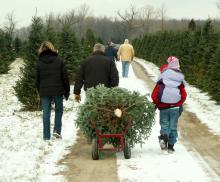
Some of my environmentally conscious friends have expressed concern about having a real Christmas tree in their house – it seems wasteful to cut down an entire tree just for a month or so of décor. After all, climate change is a huge problem, and its potential impacts on the world (most especially the poor) seem contrary to the Christmas spirit.
It’s not a new worry – Teddy Roosevelt actually banned the White House Christmas Tree during his time in office, as he was worried about the conservation implications of people running out to cut down the forest.
We can rest easy, though – the live Christmas tree industry that has developed since that time is actually a benefit to the global climate. Here’s why.
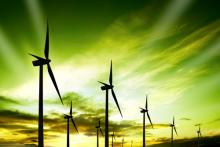
Nearly one-in-six people in the United States live in an area with unhealthful short-term levels of particle pollution. One in six. I was one of those one in six, growing up with moderate to severe asthma. I was hospitalized several times. My health was poor throughout my childhood and didn’t really show full significant improvement until after college.
It’s something I learned to deal with, not to focus on. Yet the truth is, I grew up in a part of the country with severe pollution. In our drive for cheap energy, society paid a social cost.
Luckily I grew up in a part of the world and during a time in history when medical advances kept pace with asthma, in my case just barely. My father also had asthma, as did his father before him. If I had grown up during my father’s time, I likely wouldn’t be here today. If I grew up in another part of the world I know I wouldn’t be here today.
The religious implications of climate change are becoming evermore clear, as the topic makes its way into mainstream America.
The Huffington Post reports:
Indeed, what role do religion and theology play in the accelerating conversation about climate change? This has been a banner year for extreme weather events -- from severe drought in the American Midwest to the wildfire siege in Colorado to the "Frankenstorm" of Hurricane Sandy fueled by a warming Atlantic Ocean -- which have helped the reality of climate change to register on the consciousness of most people.
Read more here.

I’ve been really lucky this month to hear some of my co-workers’ reflections on the social justice implications of their favorite Christmas carols. It’s been a great opportunity to reflect back on what it is we sing and celebrate each year, the truths we profess without even knowing it.
Naturally, I wanted to get involved, as well. As I was running through the songs I love, "Joy to the World" suddenly popped up in a new light:
Joy to the World, the Lord is come!
Let Earth receive her King;
Let every heart prepare Him room,
And Heaven and nature sing,
And Heaven and nature sing,
And Heaven, and Heaven, and nature sing.